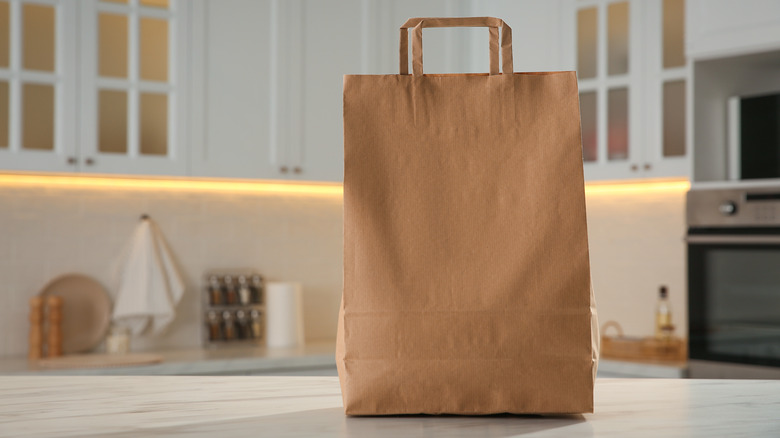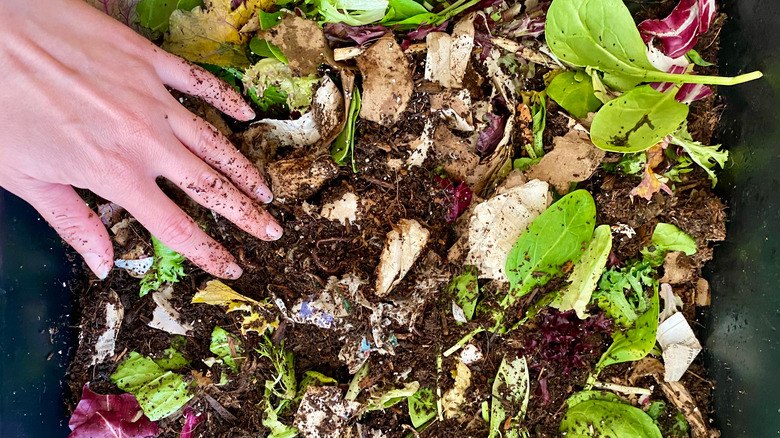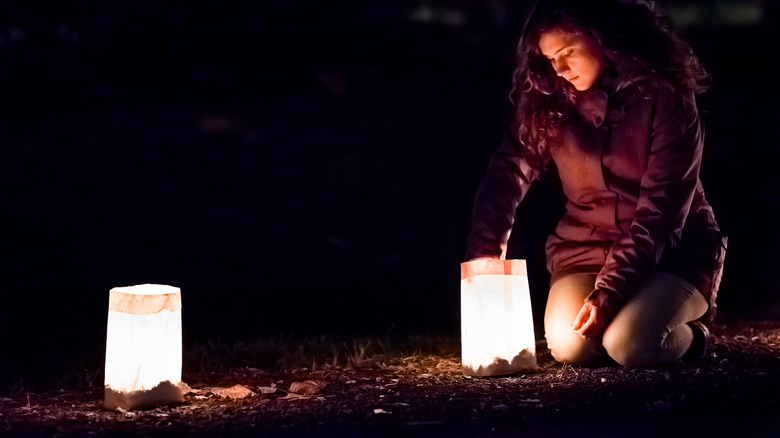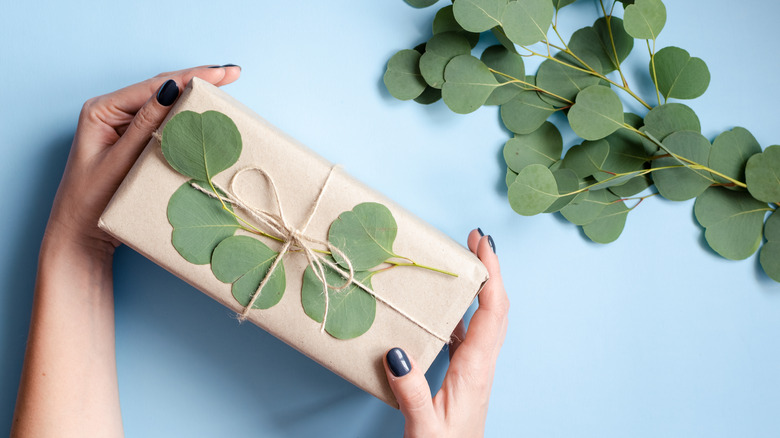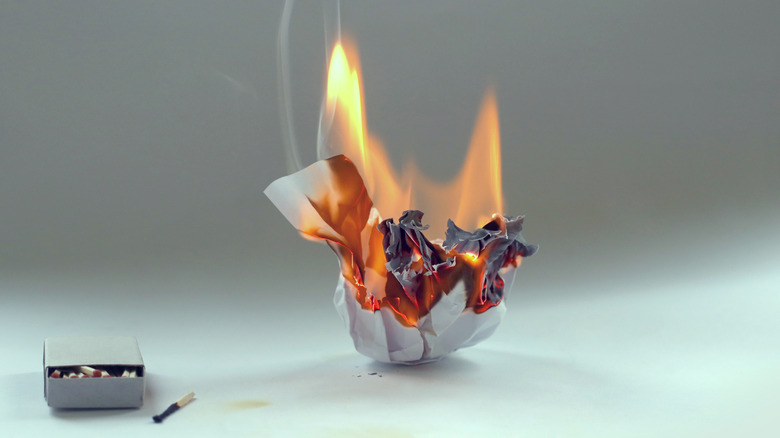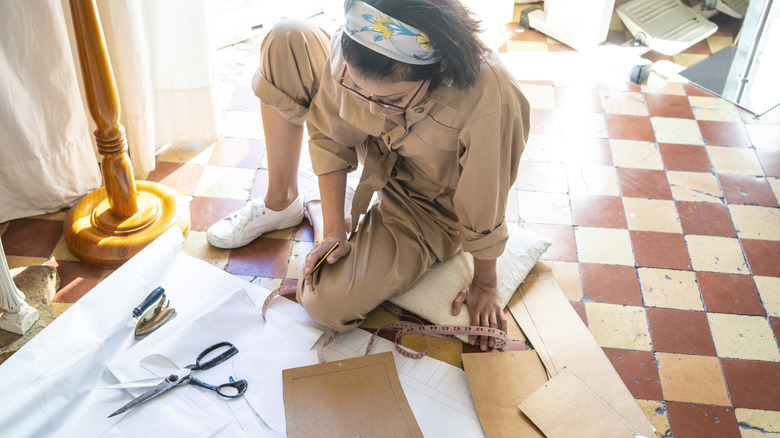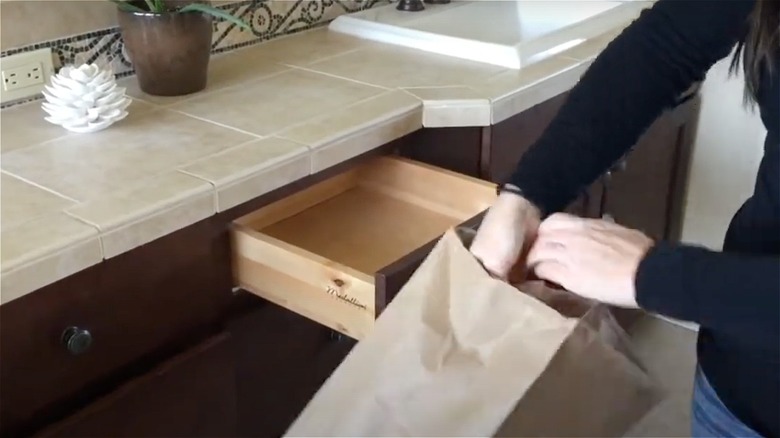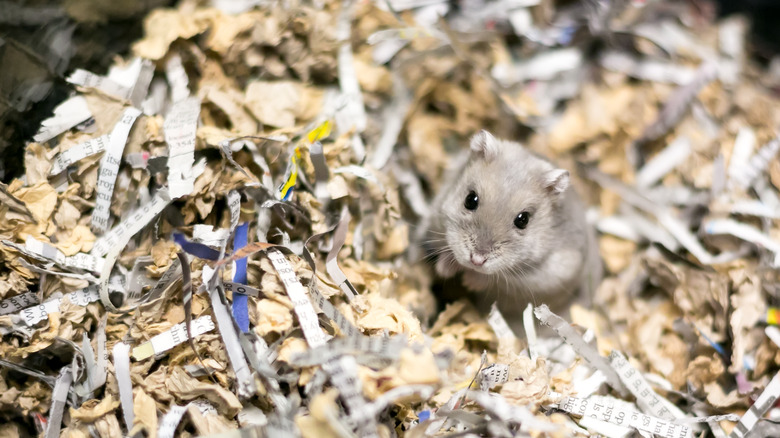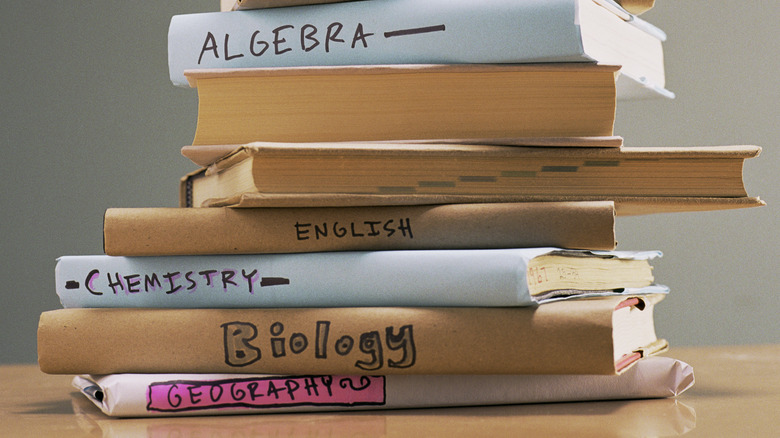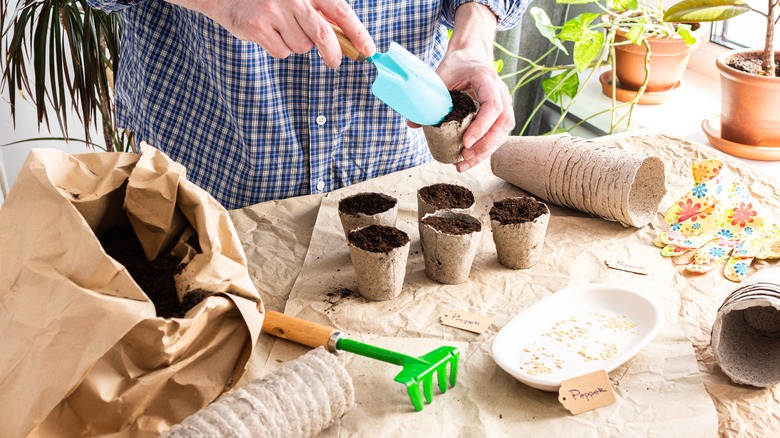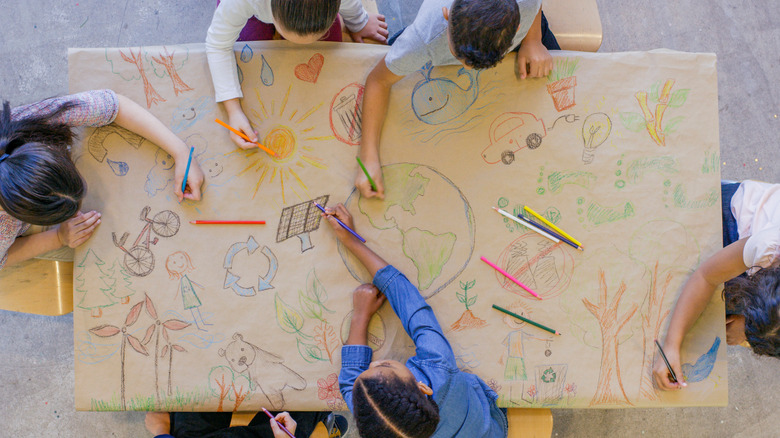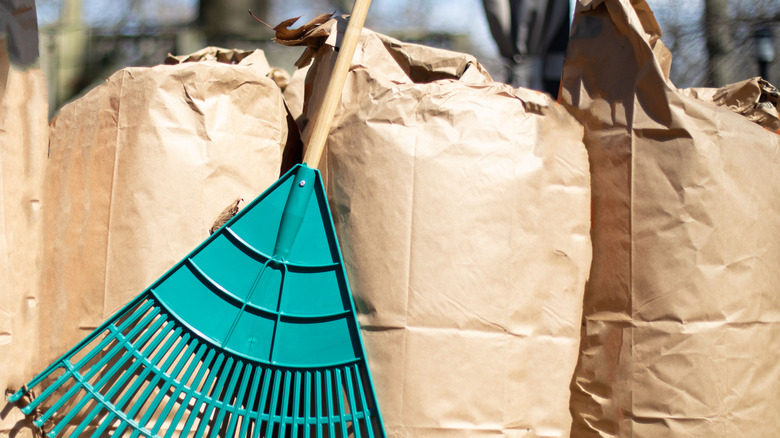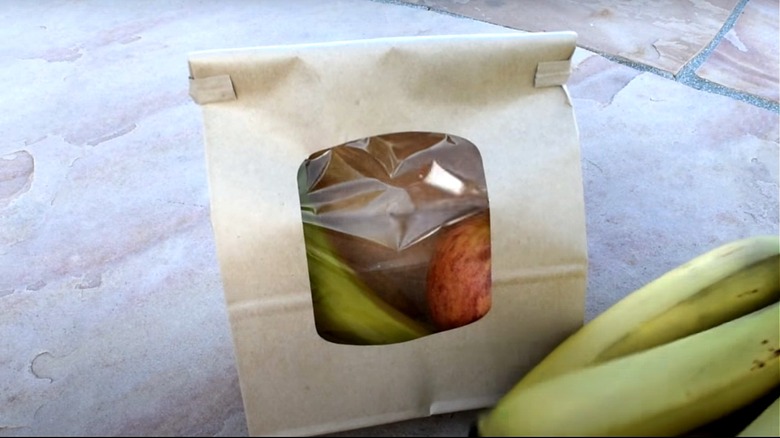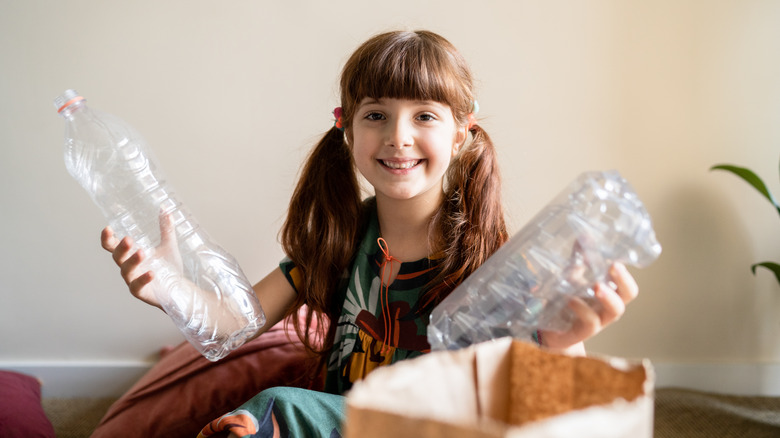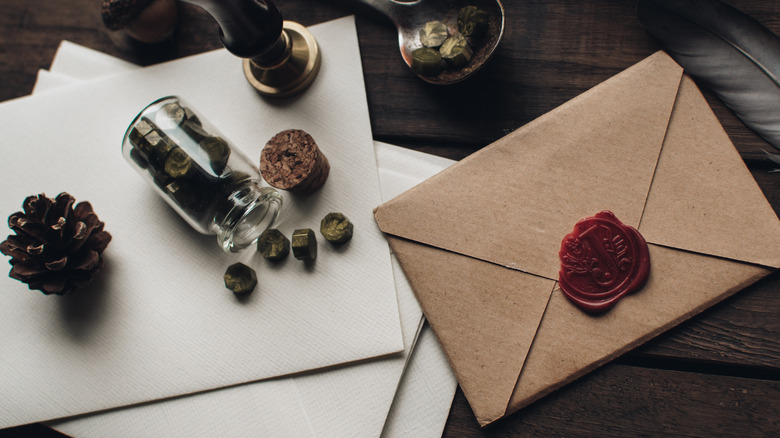Smart Ways To Repurpose Paper Bags Around Your Home And Garden
The average American throws out about 3.5 pounds of trash daily that ends up in landfills, and this has a huge negative impact on our environment. For many, this is simply unacceptable, and the solution is to decide to live a zero-waste or low-waste lifestyle. Reducing your waste is the first pillar of the popular motto, "reduce, reuse, and recycle." Recycling is another, but even recycling has its drawbacks, since energy is needed to run recycling plants. Reusing, on the other hand, not only saves materials from a landfill, but it also revamps them into something that will improve your life. Furthermore, paper bags are some of the best single-use items to repurpose. There are several ways to reuse these items around your home and garden, and we've compiled a list of 16 of our favorite ideas.
Since it can easily be cut, shredded, decorated, and molded, paper is extremely versatile. A paper bag is a natural and transformable crafting material that can be a great substitute for any other type of paper. Should you find yourself with a collection of paper bags, we encourage you to take a look at our beginner-friendly projects. Most of them require very few tools, so if you have scissors and possibly some tape or glue, you're ready to begin repurposing.
1. Add to compost
One of the easiest ways to repurpose paper bags in the garden is to simply use them to make your own DIY compost. Most paper bags are compostable if they are made out of 100% paper and don't contain any plastics, waxes, or metals. You'll need to shred the paper into smaller pieces and mix them with the rest of your compost. Because paper is high in carbon, you should keep an eye on your compost bin's nitrogen levels. Ideally, you should have a ratio of 30 parts carbon to one part nitrogen.
2. Make luminaries
Luminaries are like paper lanterns that sit on the ground. They consist of a paper bag and a light source like a battery-operated light with a fake flame (don't use real candles, as these would be a fire hazard). Thinner bags allow more light to permeate through, so they're the best choice. When decorated, luminaries make beautiful outdoor decor, and popular designs include patterns of dots, stars, and moons. If those ideas don't suit you, there are various decorative hole punchers that you can use to make patterns.
3. Wrap gifts
Instead of buying wrapping paper every time you give a gift, create your own eco-friendly wrapping paper with a paper bag. By itself, a plain deconstructed bag is simple and effective. However, it's also very customizable and full of potential for your doodles, words, or other decorations. Simply break the bag apart so you have a larger and flat piece of paper to work with. Then, use the paper as you would use any other commercial product, possibly finishing off the piece with some ribbon or twine.
4. Start a fire
Watch any season of the TV show "Survivor" and you'll find that building a fire is challenging. Whether you lost power on a cold winter night or you're in the backyard entertaining friends and family, a fire starter will get things flaming faster. Prepare a starter by shredding paper bags into small pieces, then simply place them underneath the logs in a campfire. Light these paper bag pieces to get the fire roaring.
5. Construct sewing patterns
Making your own paper patterns is incredibly easy and extremely worthwhile if you sew, and a paper bag can be the perfect medium. Simply deconstruct your paper bag so you have flat panels to work with, then trace or freehand draw the pattern on the paper and cut it out. Paper patterns should be stored in a folder or another bag to protect them from potential moisture damage, ripping, or crumpling.
6. Line drawers
Drawer liners protect your drawers from damage. Though many liners are made out of plastic or rubber, paper liners can be just as effective. Paper drawer liners also have the added benefit of being inexpensive, so should one tear, stain, or crumple, you can replace it without feeling guilty. To make your own liner, first measure the inside of the drawer. Then, take a bag apart so you have flat panels of paper. Cut the panels to match your measurements and place the liner in the bottom of an empty drawer before filling it with whatever contents you desire.
7. Protect your table
Because we eat off them, write on them, and even use them for crafting, dining tables can easily get stained. Luckily, paper is an effective table protector. You've likely seen brown paper used as a tablecloth in a restaurant at some point, demonstrating how this could be a worthwhile hack. To make a protector from bags, you'll first need to deconstruct them. Cut them into panels, tape them together, and place the protector over the table. Then, once your dinner party or crafting session is over, either reuse the piece if it's still in good condition or toss it.
8. Fill your animal cage with bedding
Shredded newspaper has long been used as bedding in small pet cages, but paper bags work just as well. Hamsters and other rodents love to burrow into the loose paper. It's also easily removed and changed with minimal cost to pet owners. To make your own animal cage bedding, simply run a bag through a shredder or cut it up into tiny pieces. You can also line a birdcage with whole panels, which would make clean-up much easier.
9. Deodorize your fridge
Bad smells tend to linger in the refrigerator because it is an enclosed space. Fish, expired meats, and other foods can really stink when they don't have proper airflow. You might clean the fridge, but the smell could still remain. To get rid of funky odors in your fridge, crumple a brown paper bag and put it in a corner of a shelf, then leave it overnight and remove in the morning. The fibers in the paper will absorb the odor-causing particles, and you can simply throw the smell away with the crumpled bag.
10. Cover books
Take a cue from college students intent on preserving their costly textbooks and protect your library with paper bags. A new paper jacket will protect the cover from damage. To create your own protective jacket, first measure the total length of the covers and spine of your book, adding an inch to the shorter ends. Next, cut out a panel that matches your measurements. Set the book on top, fold one end over the back of the front cover, and repeat with the back cover. Finally, affix the paper to the cover with tape.
11. Create seed pots
Because paper decomposes in soil, you can start seeds indoors in paper containers during the cooler months and then easily transplant them outside later. Roots will be able to break through the paper easily and establish in the new soil. The easiest way to make a paper pot is by ripping up a brown paper bag, soaking the pieces in water, and molding the drained paper pulp around a small cup. The wet pulp will dry and harden, giving you an eco-friendly seed-starting pot.
12. Use as craft or scrap paper
At the end of the day, even an empty paper bag is full of potential. Why buy new paper for drawings, crafts, and artwork when you already have paper bags? Cut them up into any shape you want and let your creativity run wild. Or, store them for when you need to take notes, brainstorm, make a shopping list, or feel like writing something out. This is truly one of the simplest and most-versatile ways to reuse this item.
13. Repurpose as a trash or leaf bag
When cleaning up around your home, carry a brown paper bag with you for small trash. You can throw out the bag and all of its contents or reuse it until it gets ripped or stained beyond repair. Outside, larger paper bags are perfect for fallen leaves. Paper bags of leaves also make a great addition to a compost bin. However, you may find that the bag takes a while to break down when it is intact, which is why ripping it up first may be a better option.
14. Ripen fruit
Did you know that you can ripen fruit in a brown paper bag? Fruits ripen as they take in more ethylene, a ripening hormone that they give off. You can speed up this process by surrounding a piece of fruit with ethylene. Just place the fruit you want to ripen in a bag with an already-ripe piece of fruit. The hormone will spread throughout the bag and cause the unripened fruit to ripen faster.
15. Collect recycling
If your recycling is co-mingled, meaning everything is collected together, storing recyclables in a paper bag is a no-brainer. Plastic bottles, aluminum cans, and other paper products will be out of the way and separate from your trash. Then, when pick-up day rolls around, just put the bag in your recycling bin. Should you need to divide your recyclables, you can still store recyclables in the bag, you'll just need to sort through it later.
16. DIY envelopes
When you use a paper bag to craft an envelope, you can create any size you want. This is especially helpful if you need to send something with odd dimensions. That way, you needn't buy an entire box of envelopes to send one thing. Brown paper envelopes also have a timeless quality that will make your mail all the more exciting to receive. To make a simple envelope, deconstruct a paper bag and cut into a rectangle, then fold the paper in half horizontally. Next, glue or tape the open left and right sides shut. Finally, fold down the top edge to make a simple flap.
